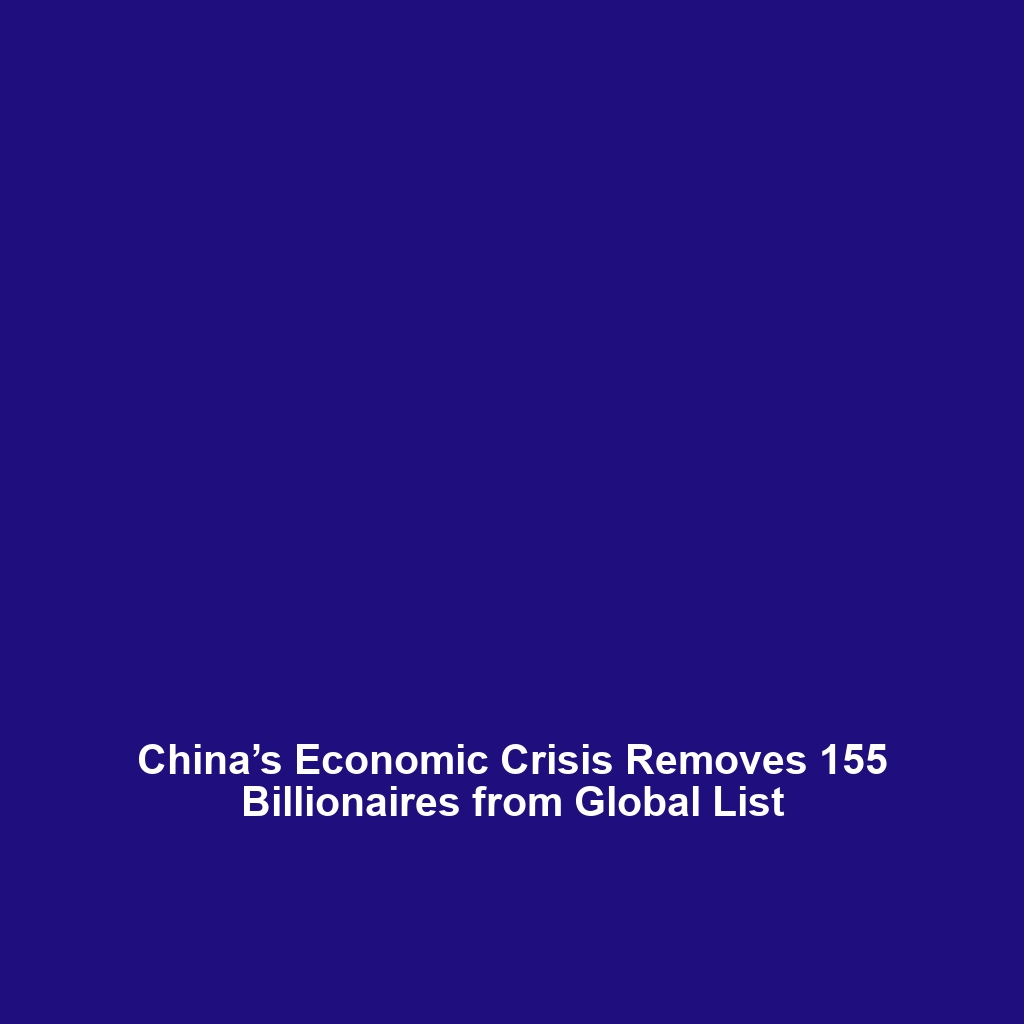Your cart is currently empty!
Tag: Economic Crisis

China’s Economic Crisis Removes 155 Billionaires from Global List
China’s Economic Crisis Removes 155 Billionaires from Global List
China’s Economic Crisis Removes 155 Billionaires from Global List
In a significant shift in the global wealth landscape, China’s ongoing economic downturn has led to the removal of 155 billionaires from the billionaires’ list compiled by Forbes in 2023. This decline is largely attributed to a series of economic challenges, including a surge in COVID-19 infections, a struggling real estate sector, and persistent inflationary pressures. As a result, the country’s billionaire count has reached its lowest level in nearly a decade.
Economic Context of the Billionaire Exodus
The removal of 155 billionaires reflects profound changes within China’s economy. According to Forbes, the total number of billionaires in China fell to 1,000, with the collective wealth of these individuals shrinking by $660 billion. Factors contributing to this decline include a prolonged slowdown in economic growth, which has fallen to its lowest rate in over three decades, coupled with external pressures such as rising interest rates and geopolitical tensions.
Impact on Key Industries
The impact of the economic crisis has been particularly severe in several key industries that historically generated significant wealth for entrepreneurs. The real estate sector, a staple of wealth accumulation for many billionaires, has been plagued by defaulting developers and declining property prices. Notably, real estate tycoon Hui Ka Yan, the founder of China Evergrande Group, saw his net worth plummet significantly, resulting in his departure from the billionaire rankings.
Moreover, technology giants have also faced scrutiny, with government regulations intensifying against large tech companies. This has directly affected prominent figures such as Jack Ma, the founder of Alibaba, who has faced challenges from government oversight that has impacted the company’s valuation.
Reactions from Financial Analysts
Financial analysts are closely observing these shifts, with many predicting that the decline in billionaire numbers could have far-reaching consequences for investment and economic recovery in China. Shang-Jin Wei, a professor at Columbia University and former chief economist of the Asian Development Bank, stated, “The loss of wealth among billionaires is reflective of broader economic pressures that could hinder investor confidence both domestically and internationally.”
Wei emphasized that the volatility in wealthy circles could signal a potential reduction in consumer spending and investment in China, which is crucial for economic rebound. As billionaires typically reinvest a significant portion of their wealth, their reduction in status may translate into decreased economic dynamism.
The Global Perspective on Wealth Redistribution
Globally, the reshuffling of China’s billionaire list signifies a broader trend toward wealth redistribution. As wealth concentration diminishes among elite classes in China, countries like the United States have seen an increase in their billionaire counts. For instance, Forbes reported that the United States added 36 billionaires to its list this year, highlighting the stark contrast in economic recoveries.
This international disparity may influence global investment patterns, prompting wealthier individuals to explore opportunities in markets perceived as more stable or favorable for growth. According to recent reports by Credit Suisse, the overall global wealth distribution continues to tilt towards developed nations, raising questions about the sustainability and long-term impact of these economic shifts.
Looking Ahead: What This Means for the Future
As China’s government grapples with these economic challenges, the path forward remains uncertain. Analysts suggest that structural reforms will be essential to restore confidence in the economy and curb the ongoing crisis. A key focus will likely be on regulations that support private enterprise while balancing state oversight to prevent market excesses.
Moreover, amidst the crisis, there are calls from economists like Michael Pettis, a finance professor at Peking University, for more sustainable growth strategies. “China needs to pivot towards domestic consumption and innovation rather than relying on property and investment-driven growth,” Pettis stated.
Conclusion
In summary, the removal of 155 billionaires from China’s wealth rankings not only highlights the depth of the nation’s economic challenges but also serves as a microcosm of the global shifts in wealth and investment patterns. As China strives to regain its economic footing, the implications of this billionaire exodus will likely resonate across markets and economies worldwide. Stakeholders will be keen to monitor how this evolving narrative affects both domestic and global economic prospects in the years to come.
For further reading on this topic, you may wish to explore additional articles on economic recovery strategies in China and the impact of wealth concentration on global economies.